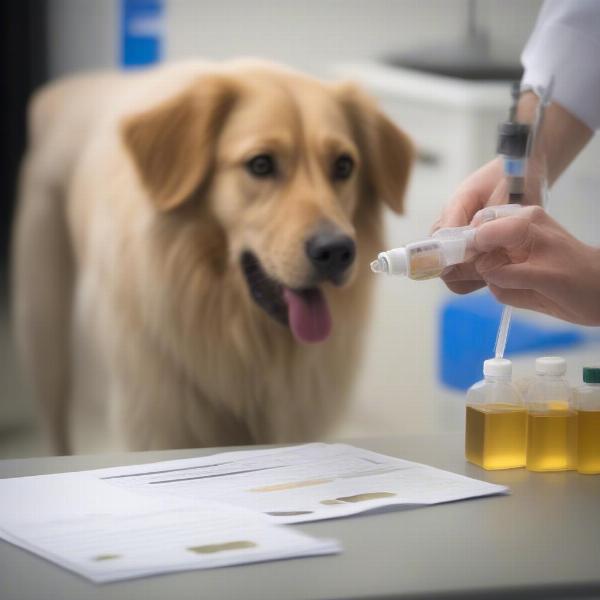Dog urine ammonia is a common concern for pet owners, often manifesting as a pungent smell in the house. While fresh dog urine doesn’t have a strong ammonia odor, the breakdown of urea in the urine by bacteria produces ammonia, causing that unpleasant smell. Understanding why this happens and how to manage it is crucial for maintaining a clean and healthy environment for both you and your furry friend.
What Causes the Ammonia Smell in Dog Urine?
The primary culprit behind the strong ammonia smell is bacterial action. Urine naturally contains urea, a waste product. When urine sits, bacteria start breaking down the urea, converting it into ammonia. This process is accelerated in warm, humid environments. Several factors can contribute to a higher concentration of ammonia in dog urine, including:
- Urinary Tract Infections (UTIs): UTIs can alter the composition of urine, making it more susceptible to bacterial breakdown and a stronger ammonia odor.
- Dehydration: Concentrated urine has a higher urea content, leading to more ammonia production.
- Medical Conditions: Certain metabolic disorders can affect urine composition and increase ammonia levels.
- Diet: A diet high in protein can contribute to increased urea in the urine.
How to Minimize Dog Urine Ammonia
Dealing with the pungent smell of dog urine ammonia involves a two-pronged approach: preventing the ammonia formation and effectively cleaning up existing stains.
Prevention:
- Ensure Adequate Hydration: Providing fresh, clean water throughout the day helps dilute urine, reducing urea concentration.
- Regular Vet Checkups: Regular vet visits can help identify and address underlying medical conditions that might be contributing to the problem.
- Dietary Adjustments: Consult your vet about adjusting your dog’s diet to ensure it’s balanced and not excessively high in protein.
- Prompt Cleanup: Cleaning up urine accidents immediately prevents bacteria from breaking down urea and producing ammonia.
Cleaning:
- Enzyme Cleaners: Enzyme-based cleaners are specifically designed to break down the uric acid in urine, eliminating the source of the ammonia odor.
- Avoid Ammonia-Based Cleaners: Using ammonia-based cleaners can actually exacerbate the problem by attracting your dog to urinate in the same spot again.
- Thorough Cleaning: Blot up fresh urine immediately and then clean the area thoroughly with an enzyme cleaner. For older stains, you may need to repeat the cleaning process several times.
Identifying Underlying Medical Issues
While environmental factors and cleaning practices play a significant role, a persistent strong ammonia smell in your dog’s urine could indicate a medical issue. If you notice a sudden change in the odor of your dog’s urine, or if the smell is consistently strong despite diligent cleaning, consult your veterinarian. They can perform tests to rule out any underlying health concerns, such as:
- Urinary Tract Infection (UTI)
- Bladder stones
- Kidney disease
- Diabetes
 Dog at vet checkup
Dog at vet checkup
Conclusion
Dog urine ammonia can be a frustrating issue, but understanding its causes and implementing preventative measures and effective cleaning strategies can significantly reduce the problem. Remember, a sudden or persistent strong ammonia smell could indicate a health issue, so it’s crucial to consult your vet for proper diagnosis and treatment. By addressing the root cause and maintaining a clean environment, you can keep your home fresh and ensure your dog’s health and well-being.
FAQ
- Why does my dog’s urine suddenly smell strongly of ammonia? A sudden change in urine odor could be due to a number of factors, including dehydration, a change in diet, or a developing medical condition. It’s best to consult your vet.
- What is the best way to clean dog urine ammonia? Enzyme-based cleaners are the most effective for breaking down the uric acid that causes the ammonia smell.
- Can dog urine ammonia be harmful to humans? While the smell is unpleasant, the ammonia levels in dog urine are typically not harmful to humans unless there is prolonged exposure in a poorly ventilated area.
- How can I prevent my dog from urinating in the house? Consistent house training, ensuring adequate potty breaks, and addressing any underlying medical issues can help prevent indoor accidents.
- Are certain dog breeds more prone to producing strong-smelling urine? No, the strength of the ammonia smell is related to factors like hydration, diet, and health, not breed.
- What are the signs of a UTI in dogs? Frequent urination, straining to urinate, blood in the urine, and a strong ammonia odor are potential signs of a UTI.
- Can certain foods cause my dog’s urine to smell more strongly of ammonia? A diet high in protein can contribute to increased urea in the urine, potentially leading to a stronger ammonia smell.
Related Articles on ILM Dog
- why would my dog pee on the couch
- can dogs pee on artificial turf
- artificial grass cleaner for dogs
- dog urine smell remover
About ILM Dog
ILM Dog is your trusted resource for expert advice on dog care and wellbeing, covering everything from breed selection and training to health, nutrition, and grooming. We are committed to providing dog owners worldwide with practical, up-to-date information to help them provide the best possible care for their canine companions. Whether you’re a seasoned dog owner or just starting your journey, ILM Dog offers valuable insights and expert guidance in all areas of dog ownership. For personalized advice or further assistance, contact us at [email protected] or call us at +44 20-3965-8624.